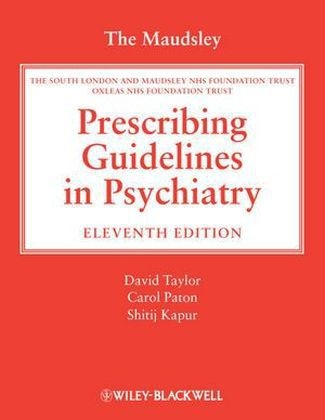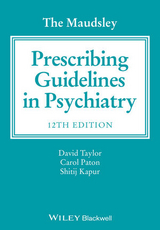
The Maudsley Prescribing Guidelines in Psychiatry
Wiley-Blackwell (Verlag)
978-0-470-97948-8 (ISBN)
- Titel ist leider vergriffen;
keine Neuauflage - Artikel merken
New content and improved format This new edition makes greater use of tables and boxes tofacilitate quick reference and includes new sections oncytochrome-mediated interactions and psychiatric side effects ofnon-psychotropic drugs. Clinically relevant Chapters address plasma monitoring, schizophrenia, bipolardisorder, depression and anxiety, children and adolescents,substance abuse and special patient groups. Each section hasa full reference list. The book covers prescribing drugsoutside their licensed indications and their interaction withsubstances such as alcohol, nicotine and caffeine. Useful for all levels of experience Trainees will gain important information regarding the rational,safe and effective use of medications for patients with mentalillness. Experienced clinicians will find excellent guidanceregarding more complex issues that they may not encounterregularly. Why the Maudsley Prescribing Guidelines inPsychiatry? Long recognized as an international trailblazer in mental healthcare, the Maudsley Hospital earned its reputation for excellence inboth in-patient and community care.
It is highly regarded forits research, and pioneered the use of clinical neuroscience. Youcan trust The Maudsley Prescribing Guidelines in Psychiatryto be scientifically sound and clinically effective.
David Taylor is Director of Pharmacy and Pathology at theSouth London and Maudsley NHS Foundation Trust, and Professor ofPsychopharmacology at King s College London. The leadauthor of all editions of the Maudsley PrescribingGuidelines, Professor Taylor is the author of several othertexts and editor of Therapeutic Advances inPsychopharmacology. Carol Paton is Chief Pharmacist at Oxleas NHS FoundationTrust, London: she is also joint Head of the PrescribingObservatory for Mental Health and an Honorary Research Fellow atImperial College London. Shitij Kapur is Professor of Schizophrenia, Imaging andTherapeutics and the Dean and Head of School at the Institute ofPsychiatry, King's College London.
Preface ix Acknowledgements x Notes on using The Maudsley Prescribing Guidelines xi Notes on inclusion of drugs xi List of abbreviations xii Chapter 1 Plasma level monitoring of psychotropic drugs andanticonvulsants 1 Interpreting sample results 2 Chapter 2 Schizophrenia 11 Antipsychotic drugs 11 Antipsychotic drugs: equivalent doses 13 Antipsychotic drugs: minimum effective doses 14 Antipsychotic drugs: licensed maximum doses 16 New antipsychotic drugs 17 Antipsychotic drugs: general principles of prescribing 21 National Institute for Health and Clinical Excellence guidelinesfor the treatment of schizophrenia 22 Treatment algorithms for schizophrenia 24 Antipsychotic drugs: monitoring of metabolic effects 26 Switching antipsychotic drugs because of poor tolerability31 Antipsychotic response: to increase the dose, to switch, to addor just wait what is the right move? 33 Speed and onset of antipsychotic drug action 36 First-generation antipsychotic drugs: place in therapy 39 Antipsychotic drugs: long-acting injections 40 Risperidone long-acting injection 44 Paliperidone palmitate long-acting injection 47 Management of patients on long-term depots: dose reduction50 Combined antipsychotic drugs 51 High-dose antipsychotic drugs: prescribing and monitoring 54 Negative symptoms in schizophrenia 57 Antipsychotic prophylaxis 60 Refractory schizophrenia and clozapine 64 Clozapine augmentation 66 Refractory schizophrenia: alternatives to clozapine 69 Clozapine: management of common adverse effects 75 Clozapine: uncommon or unusual adverse effects 78 Clozapine: serious haematological and cardiovascular adverseeffects 80 Clozapine, neutropenia and lithium 84 Clozapine and chemotherapy 88 Clozapine-related hypersalivation 89 Guidelines for the initiation of clozapine for patients based inthe community 92 Omega-3 fatty acids (fish oils) in schizophrenia 96 Extrapyramidal side-effects of antipsychotic drug treatment98 Treatment of antipsychotic-induced akathisia 103 Treatment of tardive dyskinesia 105 Neuroleptic malignant syndrome 110 Catatonia 113 Cardiovascular effects of antipsychotic drug treatment 115 Antipsychotic drugs and hypertension 122 Hyperprolactinaemia 123 Antipsychotic-induced weight gain 126 Treatment of drug-induced weight gain 128 Antipsychotic drugs, diabetes and impaired glucose tolerance132 Antipsychotic drugs and dyslipidaemia 138 Antipsychotic drugs and sexual dysfunction 142 Antipsychotic-associated hyponatraemia 148 Antipsychotics and pneumonia 150 Relative adverse effects of antipsychotic drugs: a rough guide151 Chapter 3 Bipolar disorder 153 Valproate 153 Lithium 159 Carbamazepine 168 Physical monitoring of people with bipolar disorder 173 Treatment of acute mania or hypomania 176 Antipsychotic drugs in bipolar disorder 182 Bipolar depression 185 Rapid cycling bipolar disorder 191 Prophylaxis in bipolar disorder 193 Chapter 4 Depression and anxiety 197 Depression 197 Antidepressants 201 Treatment of resistant depression 222 Treatment of psychotic depression 233 Electroconvulsive therapy and psychotropic drugs 235 Psychostimulants in depression 239 Treatment of depression in the elderly 243 Treatment of depression in stroke 247 Adverse effects of antidepressants 249 Selective serotonin reuptake inhibitors and bleeding 252 Depression and diabetes 255 Cardiac effects of antidepressants 257 Antidepressants and sexual dysfunction 264 Antidepressants and hyperprolactinaemia 268 Antidepressants: swapping and stopping 270 St John s wort in the treatment of depression 278 Drug interactions with antidepressants 281 Alternative routes of administration for antidepressants 286 Anxiety spectrum disorders 292 Benzodiazepines in the treatment of psychiatric disorders301 Benzodiazepines and disinhibition 304 Benzodiazepines: dependence and detoxification 306 Insomnia 310 Chapter 5 Children and adolescents 315 Principles of prescribing practice in childhood and adolescence315 Depression in children and adolescents 316 Bipolar illness in children and adolescents 321 Psychosis in children and adolescents 326 Anxiety in children and adolescents 327 Obsessive compulsive disorder in children and adolescents328 Attention deficit hyperactivity disorder 332 Autism spectrum disorders 337 Tics and Tourette s syndrome 345 Melatonin in the treatment of insomnia in children andadolescents 349 Rapid tranquillisation in children and adolescents 351 Doses of commonly used psychotropic drugs in children andadolescents 354 Chapter 6 Substance misuse 355 Alcohol dependence 356 Opioid misuse and dependence 372 Nicotine and smoking cessation 398 Stimulant drugs of dependence 406 Benzodiazepine misuse 407 -Butaryl-lactone and -hydroxybutyrate dependence 408 Drugs of misuse: a summary 410 Interactions between street drugs and prescribedpsychotropic drugs 414 Chapter 7 Use of psychotropic drugs in special patient groups419 Epilepsy 419 Pregnancy 430 Breast feeding 446 Renal impairment 462 Hepatic impairment 478 Prescribing in the elderly 487 Dementia 490 Behavioural and psychological symptoms of dementia 509 Parkinson s disease 518 Multiple sclerosis 522 Eating disorders 527 Acutely disturbed or violent behaviour 531 Psychotropic medications for adults with learning disabilities539 Borderline personality disorder 545 Delirium 547 Huntington s disease 554 Psychotropic drugs and surgery 558 Prescribing psychotropic drugs for patients with HIV infection564 Psychotropic drugs and cytochrome (CYP) function 573 Summary of psychiatric side-effects of non-psychotropic drugs578 Chapter 8 Miscellaneous conditions and substances 587 Psychotropic drugs in overdose 587 Biochemical and haematological effects of psychotropic drugs593 Prescribing drugs outside their licensed indications 604 Observations on the placebo effect in mental illness 606 Drug interactions with alcohol 608 Nicotine 613 Smoking and psychotropic drugs 616 Caffeine 618 Complementary therapies 624 Enhancing medication adherence 628 Driving and psychotropic medicines 634 Covert administration of medicines within food and drink 643 Index 647
| Erscheint lt. Verlag | 2.4.2012 |
|---|---|
| Zusatzinfo | Illustrations |
| Verlagsort | Hoboken |
| Sprache | englisch |
| Maße | 175 x 219 mm |
| Gewicht | 1016 g |
| Einbandart | Paperback |
| Themenwelt | Geisteswissenschaften ► Psychologie ► Klinische Psychologie |
| Medizin / Pharmazie ► Medizinische Fachgebiete ► Pharmakologie / Pharmakotherapie | |
| Medizin / Pharmazie ► Medizinische Fachgebiete ► Psychiatrie / Psychotherapie | |
| ISBN-10 | 0-470-97948-8 / 0470979488 |
| ISBN-13 | 978-0-470-97948-8 / 9780470979488 |
| Zustand | Neuware |
| Haben Sie eine Frage zum Produkt? |
aus dem Bereich



